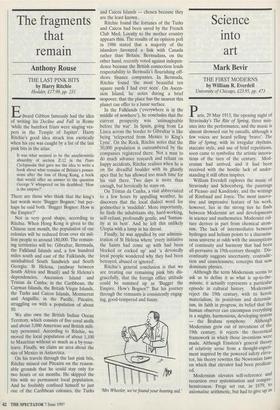The fragments that remain
Anthony Rouse
THE LAST PINK BITS by Harry Ritchie Hodder, £17.99, pp. 231 Edward Gibbon famously had the idea of writing his Decline and Fall in Rome 'while the barefoot friars were singing ves- pers in the Temple of Jupiter'. Harry Ritchie's good idea struck less exotically when his eye was caught by a list of the last pink bits in the atlas:
It was what seemed to be the anachronistic absurdity of section Z:12 in the Pears Cyclopaedia that gave me the idea to write a book about what remains of Britain's posses- sions after the loss of Hong Kong, a book that would offer an answer to the question George V whispered on his deathbed: 'How is the empire?'
There are those who think that the king's last words were 'Bugger Bognor,' but per- haps he said both. 'Bugger Bognor. How is the Empire?'
Not in very good shape, according to Ritchie. When Hong Kong is given to the Chinese next month, the population of our colonies will be reduced from over six mil- lion people to around 180,000. The remain- ing territories will be: Gibraltar, Bermuda, the Falkland Islands and, a few hundred miles south and east of the Falklands, the uninhabited South Sandwich and South Georgia; St Helena, (midway between South Africa and Brazil) and St Helena's dependencies, Ascension Island and Tristan da Cunha; in the Caribbean, the Cayman Islands, the British Virgin Islands, the Turks and Caicos Islands, Montserrat and Anguilla; in the Pacific, Pitcairn, struggling on with a population of about 50.
We also own the British Indian Ocean Territory, which consists of five coral atolls and about 3,000 American and British mili- tary personnel. According to Ritchie, we moved the local population of about 1,100 to Mauritius without so much as a by-your- leave. Finally, we claim an area about the size of Mexico in Antarctica.
On his travels through the last pink bits, Ritchie missed out Pitcairn on the reason- able grounds that he could stay only for two hours or six months. He skipped the bits with no permanent local population. And he foolishly confined himself to just one of the Caribbean colonies, the Turks and Caicos Islands — chosen because they are the least known.
Ritchie found the fortunes of the Turks and Caicos had been saved by the French Club Med. Loyalty to the mother country appears thin. The results of an opinion poll in 1986 stated that a majority of the islanders favoured a link with Canada rather than Britain. Bermudans, on the other hand, recently voted against indepen- dence because the British connection lends respectability to Bermuda's flourishing off- shore finance companies. In Bermuda, Ritchie found 'the most beautiful ten square yards I had ever seen'. On Ascen- sion Island, he notes during a brief stopover, that the place has the nearest this planet can offer to a lunar surface.
In the Falldands ('everywhere is in the middle of nowhere'), he concludes that the current prosperity was 'unimaginable before the war'. In Spain, going from La Linea across the border to Gibraltar is like being `teleported from Mexico to King's Lynn'. On the Rock, Ritchie notes that the 30,000 population is outnumbered by the companies registered there. Not a man to do much advance research and reliant on happy accidents, Ritchie realises when he is on the dreadful boulder with its ghastly apes that he has allowed too much time for his visit there. Two days is more than enough, but heroically he stays on.
On Tristan da Cunha, a visit abbreviated to a few hours by appalling weather, he discovers that the local dialect word for godmother is `muddish'. More importantly, he finds the inhabitants shy, hard-working, self-reliant, profoundly gentle, and 'human- ity at its best'. And he left this unlikely Utopia with a lump in his throat.
Finally, he was appalled by our adminis- tration of St Helena where 'every initiative the Saints had come up with had been blocked or cocked up' and 'a devotedly loyal people wondered why they had been betrayed, abused or ignored'.
Ritchie's general conclusion is that we are treating our remaining pink bits dis- gracefully, that the foreign office attitude could be summed up as 'Bugger the Empire. How's Bognor?' But his journey through the remnants is consistently engag- ing, good-tempered and funny.
Mrs Wheeler, we've found your hearing aid.'










































































 Previous page
Previous page